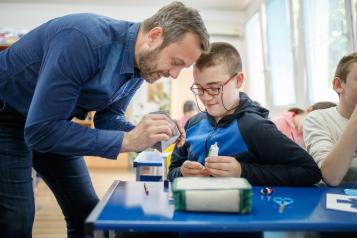What to expect after being referred for an autism assessment

There are more than one in one-hundred autistic people in the UK. Getting the correct diagnosis and support is vital.
Why have I been referred for an assessment for autism?
You might be referred to an assessment if you or people around you think you may have some signs of autism. The signs include:
- Finding it difficult to talk to and be with other people.
- Having unusual or intense interests.
- Finding some situations and experiences challenging to cope with.
- Sometimes finding noise, touch, taste and texture, lights or smells challenging to deal with.
- Strongly preferring your usual routine.
- Developing more easily in some areas than others.
An assessment means you can talk about these signs and learn their possible reasons.
What to expect before your autism assessment
The assessment should start within three months of being referred and is performed by a team of people specialising in autism. One person in this team will be your point of contact, this means they will make sure:
- You and your family know what will happen and when.
- Answer your questions.
- Get information or support for you and your family.
- Collect information to help the assessment (e.g. from your school, doctor or social worker if you have one).
- Talk to you about how information about you and your family is shared.
What to expect during the assessment
In your assessment, you and your family will be asked about different parts of your life to help them get to know you. They might ask questions like:
- What you are good at and what you find difficult.
- Any worries you or your parents have.
- How you get on at home, at school and in other situations.
- How you talk to and get on with other people.
They might think about:
- Any other physical or mental health problems you might have, including doing some health checks.
- Anything else that might make things harder for you or affect how you have grown and developed.
The team might also visit your school or home and arrange other assessments.
This information will help them to work out how best to help you and plan the right support for you and your family.

What to expect after the assessment
The autism team and your case coordinator will meet with you and your family after the assessment to explain whether they think you have autism and why.
They should give you a written report explaining their findings during the assessment and send a copy to your GP. If you agree, they should also send a copy to other relevant people in your life, such as your teacher or social worker.
If you are autistic, the team should:
- Give you information about what autism is and what it might mean for you now and throughout your life.
- Talk to you about plans for providing support for you and your family.
- Tell you when they will meet with you next. This should be within six weeks of the assessment ending.
Information and support
If you are autistic, you and your family should be given information about support in your local area, which might include:
- Support groups which can help you meet other autistic young people or learn more about autism.
- Activities that can help in your day-to-day life.
- Help to prepare for the future so you can still do the things you would like to do.
- Where to get advice about money and benefits.


